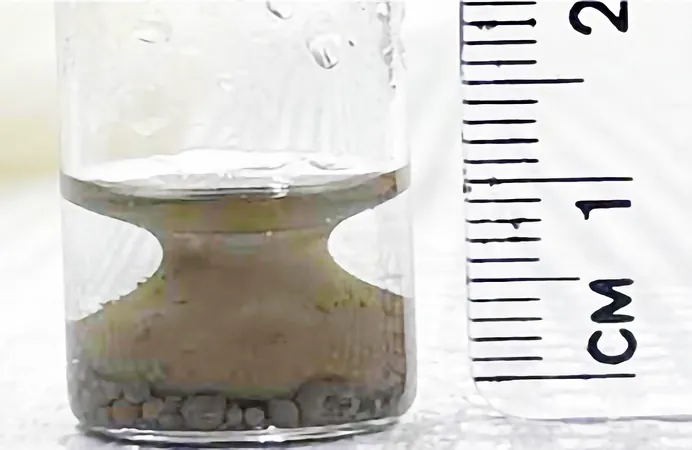
Groundbreaking CMV Treatment Shows Promise in Reducing Inflammation and Enhancing Immune Function in HIV Patients
2025-03-23
Author: Sarah
Recent Research Findings
Recent research presented at the Conference on Retroviruses and Opportunistic Infections (CROI 2025) in San Francisco has unveiled exciting results regarding the antiviral drug letermovir, primarily known for its role in treating cytomegalovirus (CMV) infection. In a groundbreaking study involving HIV-positive individuals on effective antiretroviral therapy, letermovir was linked to significant reductions in inflammation, improved CD4 T-cell counts, and enhanced physical functionality.
Expert Insights
Lead researcher Dr. Sara Gianella Weibel from the University of California, San Diego, heralded letermovir as "the most exciting intervention for inflammation and aging in HIV treatment in the last 20 years." Despite the effectiveness of existing antiretroviral treatments in controlling HIV, chronic inflammation continues to pose serious risks for those living with the virus. This inflammation can lead to a host of comorbidities, including cardiovascular diseases and frailty, particularly in the context of CMV co-infection, which has been shown to encourage immune activation.
Understanding CMV
CMV, a prevalent member of the herpesvirus group, is transmitted through various bodily fluids and is asymptomatic in healthy individuals. However, it can reactivate when immune systems are compromised, potentially leading to severe complications, especially in individuals with HIV. Before effective antiretroviral therapies were developed, HIV-positive patients frequently developed CMV-related diseases that could result in blindness and other serious health issues.
Study Overview - ACTG A5383
The study, known as ACTG A5383, explored how letermovir could improve immunological and functional aging outcomes in a cohort of people living with HIV and CMV. Participants received either letermovir in conjunction with their antiretroviral treatment or antiretrovirals alone for 48 weeks. Initial analyses of the trial indicated increased inflammatory markers; however, subsequent follow-ups demonstrated significant reductions in various pro-inflammatory proteins, illustrating letermovir's long-term benefits.
Key Findings
One key finding of the study was that participants receiving letermovir experienced a more pronounced rise in their CD4 counts, with the most significant improvements noted among those with lower baseline CD4 levels. Moreover, physical function assessments indicated notable benefits for those taking letermovir, correlating with increased immune cell metrics.
Safety and Accessibility
The safety profile of letermovir is another point of discussion; it was generally well tolerated among participants, with only mild side effects reported. Dr. Gianella Weibel noted, “While our findings suggest significant benefits for HIV-positive individuals with CMV, the high cost of letermovir currently limits its routine use.”
Future Implications
Nevertheless, this innovative treatment could mark a turning point for those with HIV, particularly women and individuals with lower CD4 counts who stand to gain the most from these advancements. As researchers continue to explore the full potential of letermovir, the hope is that a larger clinical trial will pave the way for broader accessibility to this promising therapy, thereby improving the quality of life for countless patients battling the latent effects of CMV infection while managing HIV.
Conclusion
In a world where the fight against HIV continues, letermovir’s potential as a dual-action agent – fighting both CMV and associated inflammation – could provide a brighter future for immunocompromised individuals seeking better health and longevity. Stay tuned for more updates on this revolutionary treatment and its implications for HIV management!



 Brasil (PT)
Brasil (PT)
 Canada (EN)
Canada (EN)
 Chile (ES)
Chile (ES)
 Česko (CS)
Česko (CS)
 대한민국 (KO)
대한민국 (KO)
 España (ES)
España (ES)
 France (FR)
France (FR)
 Hong Kong (EN)
Hong Kong (EN)
 Italia (IT)
Italia (IT)
 日本 (JA)
日本 (JA)
 Magyarország (HU)
Magyarország (HU)
 Norge (NO)
Norge (NO)
 Polska (PL)
Polska (PL)
 Schweiz (DE)
Schweiz (DE)
 Singapore (EN)
Singapore (EN)
 Sverige (SV)
Sverige (SV)
 Suomi (FI)
Suomi (FI)
 Türkiye (TR)
Türkiye (TR)
 الإمارات العربية المتحدة (AR)
الإمارات العربية المتحدة (AR)